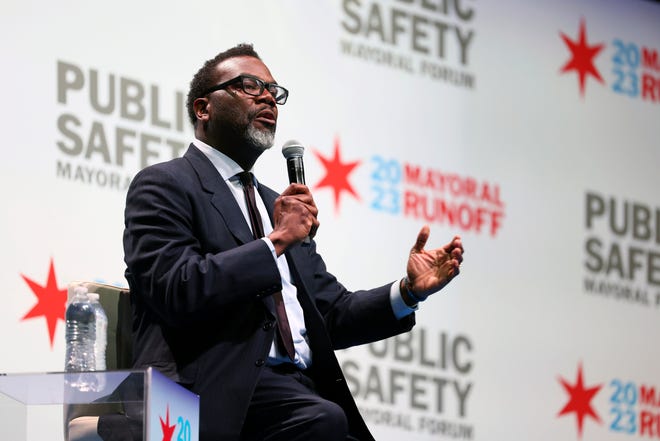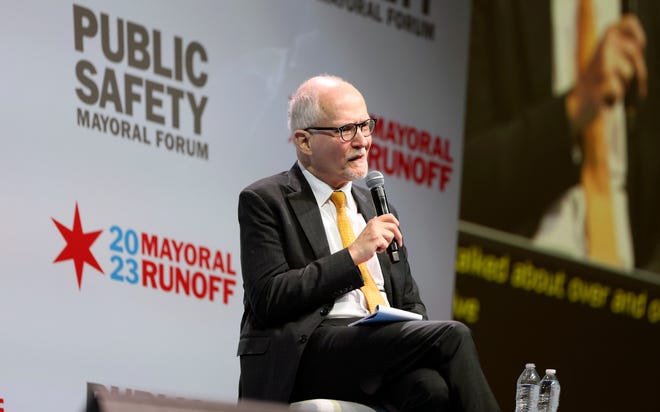
This article is more than
2 year oldCHICAGO – Voters chose former teacher Brandon Johnson to replace Lori Lightfoot to lead the nation's third-largest city, culminating the city’s mayoral election season that has centered on the increase in crime during the COVID-19 pandemic and high property taxes.
Tuesday’s highly anticipated runoff election was a tight race between Paul Vallas, a former public schools executive backed by the city's police union, and Johnson, a union organizer endorsed by the teachers union which become highly influential in city politics.
Johnson will succeed Lightfoot to be the city’s mayor after emerging as a top candidate after none of the nine candidates received a majority of the vote in the late February election.
Vallas, 69, and Johnson, 47, both with deep roots in the Democratic Party, have pitted against one another with their opposing views on issues including crime, taxes, schools and investment in policing.
They've spent the past five weeks making their final appeals to Chicagoans.
Johnson has called for expanding social programs and new taxes. The former teacher says the city should focus on mental health treatment, affordable housing for all and jobs for youth, instead of further investing in policing and incarceration.
He has also proposed a plan he says will raise $800 million by taxing “ultrarich” individuals and businesses. Johnson's plan includes a per-employee “head tax” on employers and an additional tax on hotel room stays.
Here's what to know.
Johnson’s victory was a momentous win for progressive organizations such as the teachers union. His win is the highest office of any active teachers union member in recent history, leaders say.
Get the Everyone's Talking newsletter in your inbox.Get caught up with the trending news you need to know
Delivery: Mon - FriOn Tuesday night, Vallas told his supporters that he had called Johnson and said he expected him to be the next mayor.
While some supporters seemed to jeer the news, Vallas urged them to put aside differences and support the next mayor in “the daunting work ahead.”
“This campaign that I ran to bring the city together would not be a campaign that fulfills my ambitions if this election is going to divide us,” Vallas said.
He added that he had offered Johnson his full support in the transition.

Johnson is a former teacher and union organizer who has campaigned as a progressive. He was elected as a Cook County Commissioner in 2018 and supported the teachers union during a strike the following year.
His campaign has focused on addressing the root causes of violence through investments in mental health services, education, jobs and affordable housing. Johnson has said he would promote 200 CPD detectives, increase police accountability and work closely with the city's new civilian police oversight body.
He has faced criticism over a 2020 sit-down interview in which he called "defunding the police" a "real political goal." In a campaign interview last month, Johnson said he would not "defund the police" but would take a more "holistic approach to public safety."
He is endorsed by the Chicago Teachers Union, American Federation of Teachers and other groups. U.S. Sens. Bernie Sanders and Elizabeth Warren, along with a number of U.S. representatives, have thrown their support behind Johnson. The Cook County Board president, Illinois attorney general and Rev. Jesse Jackson also endorsed him.
Lightfoot has not endorsed either candidate. The other mayoral hopefuls have largely split their endorsements between the two candidates. U.S. Rep. Jesús "Chuy" García, who placed fourth, is backing Johnson. Former mayoral challenger and activist Ja'Mal Green is backing Vallas.
Approximately 36% of registered voters turned out in the late February election. Vallas, the former head of Chicago Public Schools, secured 33% of the vote. Johnson, who serves on the Cook County Board of Commissioners, followed with 22% of the vote.
Lightfoot, 60, the city's first Black woman and first openly gay person to serve as mayor, placed third with 17% of the vote, becoming the city's first one-term mayor in 40 years. Chicago Police Superintendent David Brown resigned after her loss; he turns 63 in October – the mandatory retirement age for Chicago police officers. Both Vallas and Johnson had previously said they would replace him.

Vallas is a former schools executive who has positioned himself as a law-and-order candidate. He served as city budget director and CEO of Chicago Public Schools under then-Mayor Richard Daley and later led school systems in Philadelphia, New Orleans and Bridgeport, Connecticut.
He previously ran unsuccessfully for governor and lieutenant governor in Illinois, and he placed ninth in the 2019 mayoral election. Last year, he worked with Chicago's police union to negotiate the Chicago Police Department's contract.
His campaign has focused on public safety, school choice and reforming the city's finances. Vallas has said he would hire nearly 2,000 more sworn officers and pledged to "return CPD to its core mission."
He's also confronted some criticism over a 2009 interview in which he describes himself as "more of a Republican than a Democrat." Asked about the interview over the course of the campaign, Vallas has repeatedly described himself as a "lifelong Democrat."
Vallas is endorsed by the city's police union, the Chicago Tribune Editorial Board, U.S. Sen. Majority Whip Dick Durbin, D-Ill., former U.S. Rep. Bobby Rush, former Illinois Secretary of State Jesse White and former U.S. Secretary of Education Arne Duncan, among others.
Contributing: The Associated Press